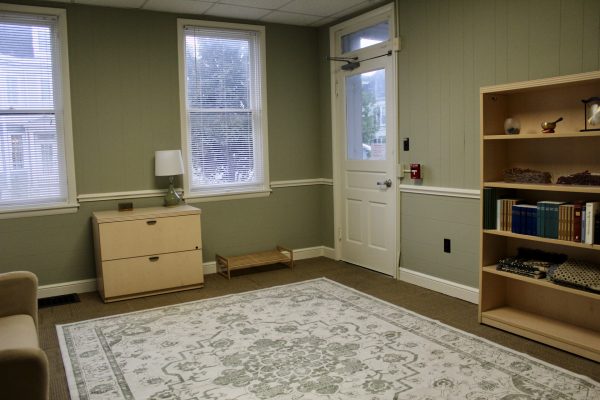Russian Dinner Celebrates Russian Cusine, Culture
More than 40 Dickinson community members gathered together to celebrate Russian cuisines and cultures at the Annual Russian Dinner. The event was held in Allison Community Room.
According to Thu Nga Duong ’20, vice president of Russian Club, the Annual Russian Dinner aimed to “let the students merge into other cultures and listen to a completely different language at the dinner table,” Duong added.
Harry Qiu ’20, treasurer of the Russian Club continued to introduce the cultural activities Russian club held. “Last year we celebrated the 100…year anniversary of the Russian revolution. At the beginning of this semester, we also celebrated Russian pancake festival. The Russian professors made the pancakes, and now we have the Russian Dinner.”
“This is the biggest event [Russian dinner] we do every year,” said Annie Mothershead ’20, president of Russian Club. According to Mothershead, besides offering students a taste of Russian culture, the Russian dinner also gave the culturally Russian people “a taste of home.” The dinner included some traditional Russian cuisines such as beef stroganoff and Olivier salad. “We went through dining services [to get the food] because there are not many Russian restaurants in Carlisle area that would cater Russian food to us, but for the catering menu, we got as close as we could”.
The dinner also included traditional Russian performances. Based in Baltimore, the group “Barynya traveled to Dickinson to bring authentic Russian songs and dances to the audience.”
According to the group’s website, they formed in 1991 in New York City “presents Russian, Cossack, Ukrainian, Jewish and Gypsy Roma traditional dancing, music, songs, and virtuoso performances.”
According to the website, the performance represented various regions of Russian dances and songs; “Metelitsa” meaning “snow storm” choreographed by Andrei Ivanov, a Russian choreographer from New York City, is a traditional folk dance from Siberia.
“We actually really enjoyed that they incorporated dances from different regions of Russia and Ukraine. I like how they include the gypsy dances and Russia Jewish dances,” Mothershead said. “It is very different forms of performance, and you don’t always have the chance to see those kinds of Russian performances,” added Qiu.
Russian Club also encouraged students to enjoy the Russian culture despite the current conflicts between the United States and Russia. “Russia and the U.S. relationships right now…at a low point,” said Mothershead. “This is like an important event to bring us together.” Duo also noted that Russian Club would like to welcome anyone who’s interested in exploring Russian language and cultures and we do not have the same stance as the Russian government.



